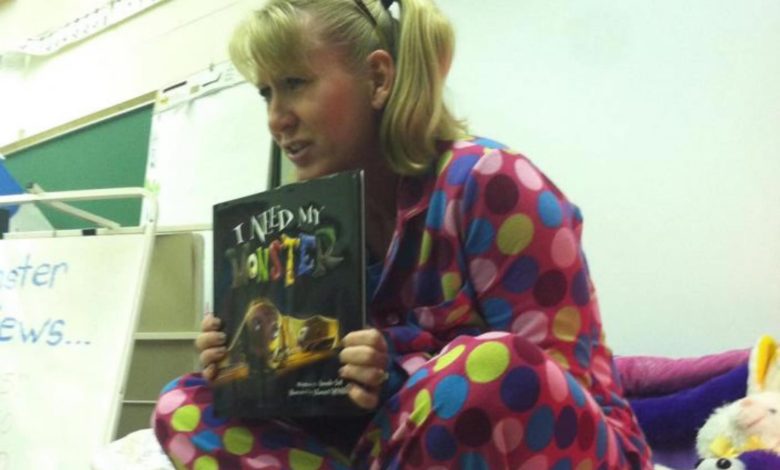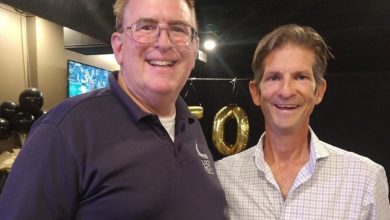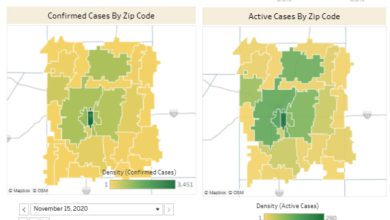Classic Plumbing’s PLUMBER of the Month: Jen Tee

Each month, Classic Plumbing recognizes a community member who is giving back in extraordinary ways. Teachers are recognized during the month of May for their service to the community in Teacher Appreciation Month. This month, Tim Culver, owner of Classic Plumbing, recognizes Mahomet resident Jen Tee for the difference she’s made in the lives of students in the Unit 4 School District.

If a child is at school for the mandated 180-days, they will spend approximately 1,080 hours in school each year.
With bus rides and extra-curricular activities, some children are at school more than they are in their own homes.
Still, what happens at home often comes to school and what happens at school, often goes home.
This is how Mahomet resident and Instructional Specialist in the Champaign Unit 4 School District, Jen Tee, has approached her 22-years as an educator.
***
Tee has always loved being around children.
As an elementary and junior high student, she gave up her lunch-period recess to help the kindergarten teacher welcome the five- and six-year-olds as they came to school.
“She’d let me lead circle time,” Tee said. “She would lead the class, but then I would go around and help kids learn to do certain things.”
After graduation, she left home to pursue her degree in elementary education at Eastern Illinois University before returning home as a student teacher.
Under the guidance of the well-known kindergarten teacher Jan Comstock, Tee began to learn how to manage the classroom.
“I think she believed that if you’re going to go into teaching, you need to get every minute that you can in front of the kids,” Tee said. “By the second day, she had me doing very simple things. Then by the end of that first week, I was doing some things on my own.”
Tee learned the “art” of teaching from Comstock. Without a district-wide kindergarten curriculum, she wrote lesson plans, found resources and (learned) how to get creative in reaching students.
“That was really empowering,” she said.
***
Shortly after graduation, Tee was hired mid-year as a kindergarten teacher at Robeson Elementary.
During the interview she reconnected with her kindergarten teacher, Margorie Kline.
“She was also known throughout the district for being this phenomenal, perfect, wonderful, kindergarten teacher,” Tee said.
“She kind of took her glasses, put them down on her nose and said, ‘Jenny Bowman, is that you?’ ”
Tee spent the next 22-years capturing the minds and hearts of kindergartners, first-graders and second-graders, kids who needed help in reading or those who were at the top of their class in various schools throughout the Unit 4 School District.
“I do care about their reading. Reading is a gateway,” Tee said. “I do care about their math; of course, in elementary it’s the fundamentals. But I really care that they learn problem-solving skills and flexibility and love.
“If we go through life and we don’t have relationships, and we are not able to be flexible and problem-solve, it doesn’t matter what you know, it’s going to be hard to be successful.”
Tee said the youngest learners are eager and open to learning.
“Every day is fresh and new, they are full of love, they call you ‘mom,’ they hug you,” she said.
But getting students to that point sometimes takes a little extra time.
“My first goal as a classroom teacher is to bond us as a family,” she said. “And to help us understand that we are all in this together.
“Things are going to happen: some good, some bad, some in-between, but no matter what happens, we are all in it together. And no matter what happens, we are going to love each other through it.
“You just can’t get through life any other way.”
***
While Tee celebrates the big moments where children hit their reading benchmark or grasp a math topic, she said the bigger moments are ones where the child experiences a transformation.
As a teacher at Kenwood Elementary, Tee remembers comforting a boy whose flower broke.
“He was going to give it to me on Teacher Appreciation Day,” she said. “Instead, I showed him how to float a flower.
“‘Let’s learn how can we turn this around. To me, those are the more valuable skills. And he still remembers that and talks about that.”
Tee’s toughest year was with a kindergarten group that had a myriad of life-altering events happening all at the same time: a boy’s father had been diagnosed with a brain tumor, a girl’s sibling was born with Down Syndrome and heart defects, another family was going through a divorce.
“I don’t think it was until about the 32nd day of school that I felt like we gelled,” Tee said.
“I remember going to my principal that year, saying I can’t work on core academics quite yet; they need some time, this is a unique group.
“In that classroom, there was a lot of trauma. So before you can teach kids, you have to meet them where they are at.”
Part of the class coming together meant that they had to be aware of a classmate who had seizures.
Tee assigned various jobs to different students: one child got a snack, the other brought the bean bag chair to prop him up while another child ran to the office to get help.
“We had a whole system, but that didn’t just happen,” Tee said.
“Everybody talks about high-stakes learning and test scores, but to me, learning to take time to take care of the people that are around you,” she said. “They still learn to read and do math. They still went on to first grade knowing how to read, and most of them above grade level.”
Tee said that the trauma that a child experiences may be different than what an adult thinks or how an adult experiences trauma.
“You have to meet them where they are at, and they will meet you where you’re at,” she said.
***
Tee has found that through having high expectations under all circumstances, students will meet her there when they feel loved and secure.
“You can have trauma in your life, and things can be going on, but you’re still going to be a great reader, and you’re still going to be a great mathematician or great scientist because I have to have you ready for this world, too,” Tee said.
“They always rise to the occasion. They are amazing.”
Sometimes those stories don’t come full circle for many, many years, though.
Tee recalls a student she had many years ago who was living with his grandma and grandpa, but didn’t want to be; he wanted to be with his mother.
“He kept trying to do things to be taken to his mom,” Tee said. “He kept stealing stupid things; nothing that really mattered to anyone because he’s a good kid. He thought if he stole, he would get taken to jail with mom.”
After months of intervention and recourse, the district, alongside the grandparents, decided to show the young boy what would happen and where he would go if he was caught stealing.
“We needed to do something with him where he was safe,” Tee said.
She didn’t just pass the student on as he continued through his years in grade school, though.
“I always told him, you are so smart, and you are the best athlete,” Tee said. “You can do anything. You can get to college, you can get a scholarship, you can be an electrician, you can be an apprentice, whatever you want to do. You’re going to knock it out of the ballpark.”
Many years later, Tee was shopping with her mom for Christmas presents at Toys ‘R Us when she felt a huge bear hug from behind.
“Just like my kindergarten teacher did, I saw his eyes,” she said.
“I said his name. He started crying. I started crying. And he says, ‘Because of you and the assistant principal at the time, I am on a college scholarship for football. You believed in me.’ ”
***
Tee has also seen that sometimes it takes a teacher to believe in the parents, too.
She noticed that two girls, who were always impeccably clean and well-fed, began coming to school with stains on their clothes.
The mother approached their teacher, asking for stain remedies.
Tee wondered if the family was having appliance trouble or if their water had been turned off. She offered to do the family’s laundry.
When she talked to the mother, she learned that she was trying to get a food service certification while also working to support her children.
“She was using all the resources she could,” Tee said.
Getting the children to the babysitters in time to catch the bus to school while also catching the MTD bus at the same time was also a struggle for the young mother. Tee made arrangements for the children and the mother to get to where they needed to be.
In gratitude, Tee was invited to the mother’s graduation. And as the mother built a life for the children, they were able to get their own apartment.
“It’s not just about classroom stuff; you have to go above and beyond, I think,” Tee said. “We’ve got to help each other out. Life is hard. More for some people than others. If you can do something, you should do it.”
Sometimes Tee has found it’s just offering a safe place for parents.
She has mentored a young woman who was trying to figure out how to be a mother when her daughter entered kindergarten as she just turned 19.
It’s also been about providing solutions to those parents who are just trying to figure out how to juggle everything in life.
When a student was dropped off at school every day at 11 a.m., Tee decided to ask the mother if she needed help.
She found out that the mother was going to night school, then working overnight. She was trying to sleep in the morning hours before having to do it all again the next night.
Tee told her that if she would just get up for 10 minutes to get her daughter on the bus, she would take care of making sure the child could get breakfast and learn to read.
“I’ll do all the hard stuff, I’ll do the school stuff, you just get her here,” Tee told her.
“The girl learned to read within weeks because she was there.”
The mother brought her friend who was experiencing the same issues to Tee.
“‘Just do what Mrs. Tee says,’” the woman told her friend. “‘I promise you, your daughter will learn to read, too.’
“And she did,” Tee said. “She knew I wasn’t mad at her. She knew I really wanted her daughter to learn to read and do math.”
“Parents just want to know you love their kids and see potential in them. All kids have potential. There’s not one child out there who is not gifted in some way. They all have potential. You just have to find what their niche is.”
***
In all the years she’s taught, Tee knows that it’s not just the kids who appear to be struggling who are those who struggle.
She remembers a boy who was artistic and bright, but got into trouble every now and then, even though his family was affluent. When she got her first computer in her classroom, Tee asked the boy to help her figure it out.
The boy went on through school, then years later she saw him at County Market.
He did not remember her, but she asked him if he was doing anything with art or computers.
The boy was shocked that she remembered his talent. He told her that he wasn’t doing anything in arts or computers, but that he wanted to.
Tee wrote a letter of recommendation for the boy, who ended up attending Parkland College to pursue his education.
“If what you are offering as an adult is a loving and supportive environment, they are going to feed into that, I’ve found,” Tee said.
Recently, Tee moved from a classroom teacher to an Instructional Specialist within the district. While her home-base will still be Kenwood, she will work with teachers throughout the district who need a little help problem-solving.
“Everybody is different, and I have to meet everyone where they are at,” she said. “Not everybody needs an instructional coach, you may need one one semester or quarter, but not another.”
This year she worked with one teacher who just needed a lift with behavior management and another who wanted to help her students become better listeners.
“I don’t have all the answers; they are the experts on their students because they are with them all day,” Tee said.
“It’s not about me necessarily being an expert, even though I’ve taught; but it’s more about me helping others talk through and trying to figure out what is it they want to see. What is it they’ve seen that goes well already, and how can we work off of that strength to build on that for your students?”
***
Even after 22 years in the field, Tee is still learning.
She’s currently reading and interested in the book, “Culturally Responsive Teaching and the Brain” by Zaretta Hammond, which examines cultural differentiation in the brain and how that translates into behaviors and learning in the classroom.
“I’ve started observing things differently when I’m out and about,” she said. “I’ve started questioning things. Why do some children look down when you speak to them? It’s not necessarily disrespectful like it would have been in my family growing up.
“Why do some people in class talk to each other all the time? In some cultures, learning is a social thing; you don’t do that in isolation.”
As a teacher or an instructional specialist, this means re-examining the classroom to provide quiet time, one-on-one time, small and large group instruction so that every student can be in a comfortable learning environment at some point during the day.
Tee said being part of the Unit 4 School District and at Kenwood Elementary for so long has been good for her both professionally and personally.
A few years ago, Kenwood delved into conversations about how they could turn their school environment around.
“I feel like my school was struggling a little bit, and I’m really proud to be a part of Kenwood because the staff came together and said why are we struggling and what can we do about it?
“Our biggest thing is that we decided we want to love our families first.
“Subs who come in and families who come in will say Kenwood feels like family.”
The school made an effort to open its doors to parents who wanted to help in the classroom while also providing opportunities for parents to experience their child’s successes both during and after school hours.
“I think it’s important for kids to see their parents there,” Tee said. “It does something cyclically somehow for the child and the parent. (Students) need to know that their parents care and are invested.
“If you can feel loved and like family, just think of the potential you can reach when you feel safe like that.
“And then after that, we can do all the other academic things that we are there to teach, but you’ve got to get them there first.”




